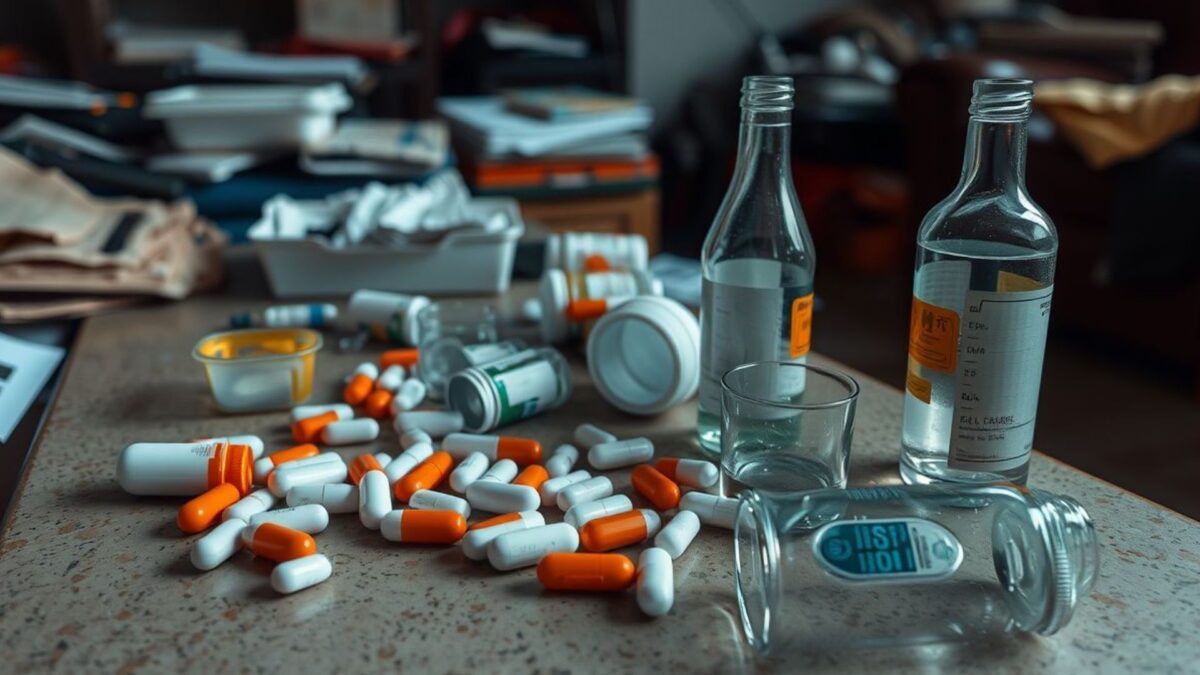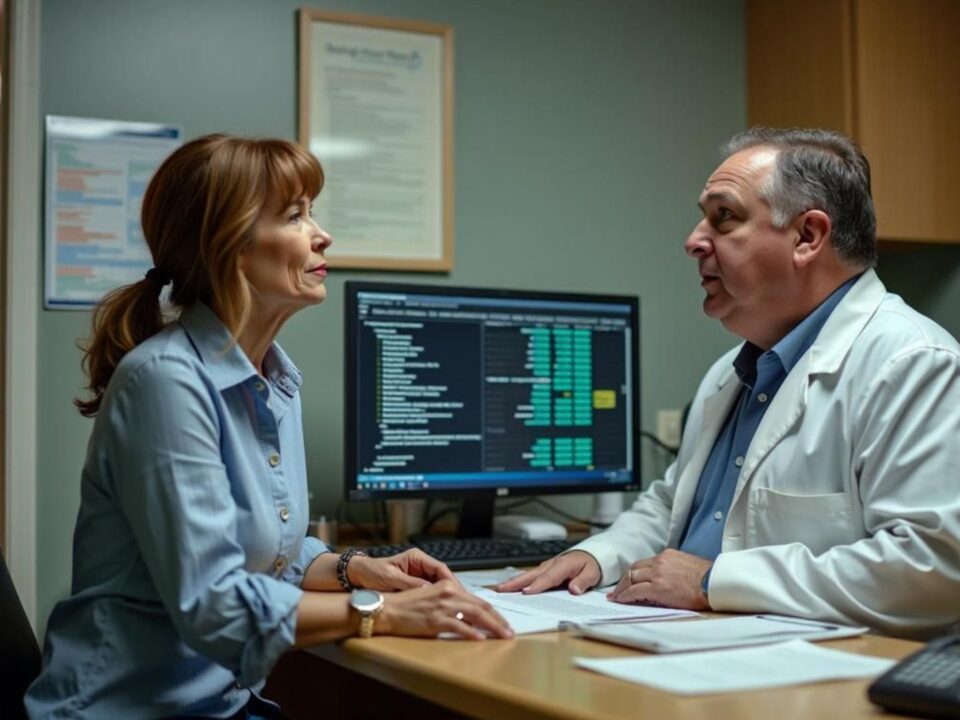
What Are The Benefits Of Early Support Co-Occurring Disorders Treatment For Family Members?
January 21, 2025
How To Choose The Right Co-Occurring Disorders Treatment Program?
January 21, 2025Dealing with both addiction and mental illness can be tough. Many people face relapse during their co-occurring disorders treatment. This happens even after they’ve made progress.
One key fact is that managing co-occurring disorders often takes longer than treating a single issue. Treatment needs to address both problems at the same time for it to work well.
This blog will help you understand why relapses are common in co-occurring disorders treatment, what causes them, and how to find support if you do relapse. Keep reading to learn more!
Key Takeaways
- Stress and trauma greatly raise the chances of relapse in co-occurring disorders.
- Inadequate coping skills often lead people back to harmful habits.
- Environmental triggers and genetic factors increase relapse risks.
- Integrated mental health treatment combining therapy, medication, and self-care is crucial but does not fully prevent relapses.
- Aftercare programs provide essential ongoing support to maintain recovery.
Understanding Co-Occurring Disorders
Co-occurring disorders are a common phenomenon, affecting millions of people worldwide. According to the Substance Abuse and Mental Health Services Administration (SAMHSA), approximately 8.9 million adults in the United States have co-occurring disorders. These conditions can be particularly challenging to diagnose and treat due to their complexity. Effective treatment requires a comprehensive approach that addresses both the substance use disorder and the mental health condition simultaneously. This dual focus is essential for achieving long-term recovery and improving overall well-being.
What Are The Main Causes Of Relapse In Co-Occurring Disorders And Substance Use Disorder?
Stress plays a major role in relapse for those with co-occurring disorders in Kokomo, Indiana. High levels of stress often trigger substance use or mental health issues. Trauma can also cause setbacks, making it hard to maintain recovery.
Another key factor is inadequate coping mechanisms. Without healthy ways to deal with emotions, many turn back to old habits. Mental health disorders like depression and anxiety disorders further increase the risk of relapse.
Environmental triggers pose another challenge. People may encounter places or people that remind them of past substance use. Genetic predispositions contribute as well; some have higher risks due to family history.
Treatment involves more than just stopping drug abuse. Integrated treatment for co-occurring disorders addresses both mental health and addiction simultaneously. Psychotherapy, medications, and other therapies offer support against relapse causes.
Assessment and Diagnosis
The assessment and diagnosis of co-occurring disorders involve a comprehensive evaluation of an individual’s physical, emotional, and psychological well-being. A thorough assessment typically includes several key components:
- Medical History and Physical Examination: Understanding the individual’s medical background and current physical health.
- Psychological Evaluation: Assessing mental health symptoms and identifying any underlying psychiatric conditions.
- Substance Use Disorder Assessment: Evaluating patterns of substance use and its impact on the individual’s life.
- Review of Previous Treatment and Medical Records: Gathering information from past treatments to inform the current diagnosis.
- Family and Social History: Considering the individual’s family dynamics and social environment.
A comprehensive assessment is crucial for developing an effective treatment plan that addresses both the substance use disorder and the co-occurring mental health disorder. Mental health professionals, such as psychologists or psychiatrists, often use standardized assessment tools and diagnostic criteria to accurately diagnose co-occurring disorders. This detailed evaluation helps in tailoring a treatment plan that meets the unique needs of each individual.
Why Is Relapse A Normal Part Of Recovery For Co-occurring Disorders Treatment?
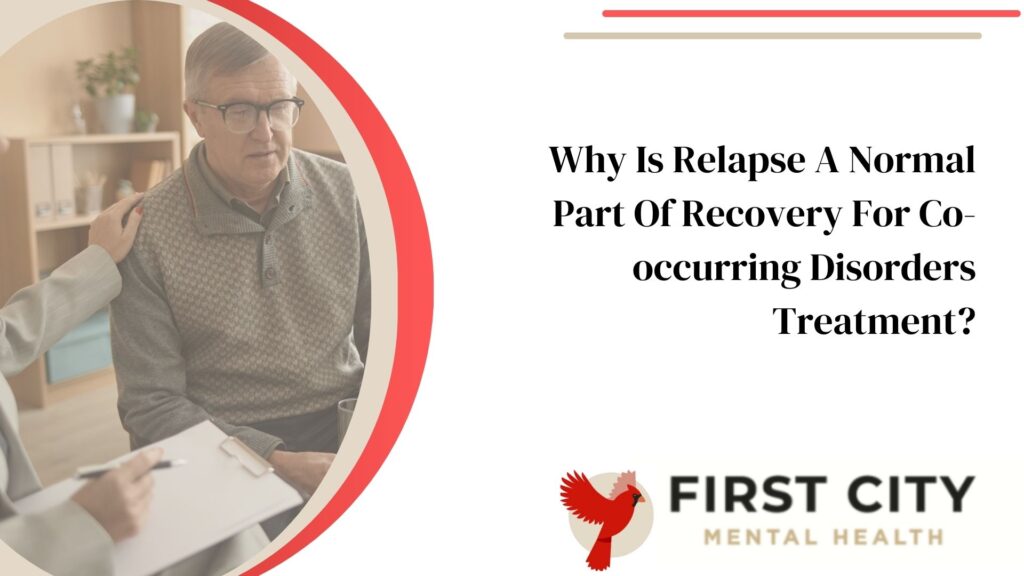
Relapse often occurs because co occurring disorders treatment (mental health and substance use disorders) is complex. Both issues need attention at the same time, making recovery challenging.
Individuals with these conditions face more severe health challenges. Such difficulties increase the likelihood of a setback.
Various stressors, like relationship problems or job loss, can trigger relapses. Effective treatment combines therapy, medication, and self-care strategies to manage both disorders.
This approach helps lower relapse rates but does not eliminate them entirely.
When Do Relapses Typically Occur During Treatment?
Relapses often happen during integrated treatment for co-occurring disorders. Knowing the timing and causes can help in managing both substance use and mental health conditions.
- Early Stages of Treatment:
- Many patients face difficulty adjusting to new routines.
- Stress from starting treatment can lead to relapses.
- After Initial Progress:
- Patients may feel overly confident after early successes.
- This overconfidence can make them lower their guard against triggers.
- During High-Stress Periods:
- Life events like job loss or relationship issues can trigger a relapse.
- External pressures increase stress, leading to setbacks.
- Following Traumatic Events:
- Trauma-related conditions like PTSD heighten relapse risks.
- Exposure to trauma reminders can cause significant setbacks.
- When Support Systems Falter:
- Lack of support from family or friends contributes to relapses.
- Patients with weak support networks face greater challenges in maintaining recovery.
- During Medication Changes:
- Adjusting medications for mood disorders might cause instability.
- Mood swings or side effects from new meds increase relapse chances.
- At Major Milestones:
- Big life changes, such as moving or changing jobs, are critical times.
- The uncertainty and anxiety around these milestones make individuals more vulnerable.
- Periods of Isolation:
- Isolated individuals struggle more with maintaining healthy behaviors.
- Loneliness exacerbates symptoms and invites relapse patterns.
- When Aftercare Programs End:
- Post-treatment programs reduce relapse risks significantly.
- Without ongoing aftercare, patients might lose focus on their progress.
Understanding these timeframes helps in preparing better support systems for those undergoing treatment for co-occurring disorders in places like Kokomo, Indiana.
Where Can You Find Support After A Relapse In Treatment?
Professional help is crucial for managing symptoms after a relapse in co-occurring mental disorders treatment. Seek assistance from therapists and counselors who specialize in these conditions.
Medication management helps cope with thoughts and behaviors that can lead to another relapse.
Support groups offer emotional support and practical advice from peers facing similar struggles. Programs at co-occurring disorders treatment centers often include group therapy sessions.
Alternative therapies like art therapy and meditation also enhance treatment for co-occurring disorders providing a well-rounded recovery plan.
How Do Stressors Contribute To Relapse In Co-Occurring Disorders?
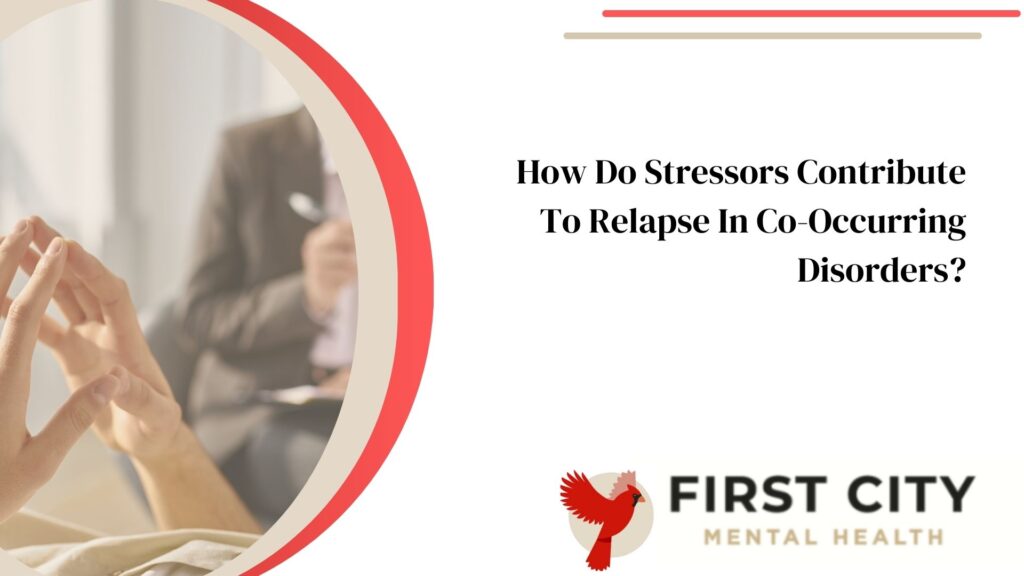
Stressors often lead to relapse in co-occurring disorders treatment centers. Relationship issues and job loss can trigger emotional distress, causing someone to turn back to harmful behaviors.
Grief also contributes by leading to intense emotional turmoil, making it hard for someone to stay on track with their recovery.
Major Depressive Disorder (MDD) brings prolonged sadness and a lack of interest in daily activities. This makes relapse more likely during co-occurring disorders treatment. Environmental stressors worsen symptoms in people with Schizophrenia, which may cause a setback in their treatment progress.
PTSD symptoms like anxiety and depression further increase the risk of relapse, as do other mental health disorders.
What Role Does Lack Of Support Play In Relapse Rates?
Lack of support significantly raises relapse rates in individuals undergoing adult co-occurring disorders treatment, including those with borderline personality disorder. Without adequate backing, people may engage in emotional self-harm or serious self-injury.
Major Depressive Disorder (MDD) symptoms can also worsen without support, making adherence to treatment plans difficult.
Grief from life events often triggers relapses when no one helps with coping. Mental health care providers and loved ones play a crucial role in offering this needed support. This assistance can prevent relapse and promote well-being in adult co-occurring disorders treatment programs.
Integrated Treatment Approach
Integrated treatment for co-occurring disorders involves a comprehensive approach that addresses both the substance use disorder and the co-occurring mental health disorder simultaneously. This approach recognizes that these disorders are interconnected and that treating one without addressing the other can lead to poor outcomes.
Integrated treatment may include a combination of the following components:
- Medications: Prescribing medications to manage symptoms of mental health disorders, such as antidepressants or anti-anxiety medications.
- Behavioral Therapies: Utilizing therapies like cognitive-behavioral therapy (CBT) or dialectical behavior therapy (DBT) to address both substance use and mental health symptoms.
- Support Groups: Participating in 12-step programs or peer support groups to gain social support and encouragement.
- Family Therapy: Engaging in family therapy to address family dynamics and improve relationships.
- Case Management: Coordinating care and providing support services to ensure comprehensive treatment.
Integrated treatment for co-occurring disorders can be provided in various settings, including outpatient clinics, inpatient hospitals, and residential treatment centers. A multidisciplinary treatment team, which may include psychologists, psychiatrists, social workers, and addiction counselors, works together to provide holistic care. This collaborative approach ensures that all aspects of the individual’s health are addressed, promoting better outcomes and long-term recovery.
Why Is Aftercare Essential To Prevent Relapse In Mental Health Treatment?
Aftercare offers ongoing support and resources after the primary treatment for co occurring disorders. It helps individuals keep making progress in managing both mental health and substance use issues.
Regular therapy, support groups, medication management, self-care strategies, and specialized mental health treatment are crucial parts of aftercare.
Identifying relapse triggers is another key benefit of aftercare. Individuals learn coping skills to handle stressors that might lead to a relapse. This long-term support system is essential for people undergoing co-occurring disorders treatment in places like Kokomo, Indiana.
How To Identify Triggers That Lead To Relapse?
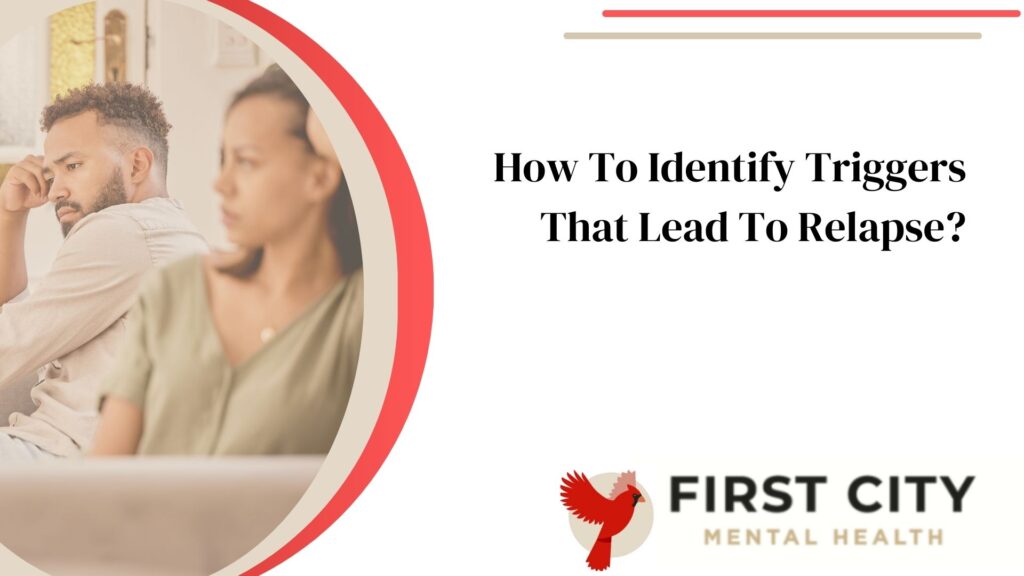
Understanding and addressing key factors can help prevent relapses in treatment of co-occurring disorders:
- Recognize Stressful Life Events: Stressful events like job loss or the end of a relationship can trigger relapse. Recognizing these events ahead of time helps you prepare.
- Monitor Environmental Factors: Avoid places or people associated with past substance use, as they can be triggering and increase the risk of relapse.
- Watch Emotional States: Grief, major depressive disorder, and mood disorders often lead to relapse. Keeping track of your emotional health is vital.
- Identify Specific Mental Health Issues: Conditions such as bipolar disorder, obsessive-compulsive disorder, and personality disorders heighten the risk of relapse, and should be addressed with your therapist.
- Acknowledge Serious Conditions: Serious conditions like schizophrenia, suicidality, and post-traumatic stress disorder require extra care in managing triggers effectively.
- Make Use of Medication and Psychotherapy: Medication and therapy are crucial for managing co-occurring disorders and preventing relapse.
- Practice Self-Care Strategies: Implement self-care routines such as meditation and exercise to better handle potential triggers.
- Seek Ongoing Support Systems: Peer groups, family support, and counseling services provide encouragement and guidance, especially post-relapse.
- Utilize Effective Treatments: Integrate treatments that combine medication, psychotherapy, and self-care to effectively manage triggers and prevent relapse.
By understanding and addressing these factors, you can gain valuable insight into preventing relapses during the treatment of co-occurring disorders.
Final Thoughts
Relapses happen often in co-occurring disorders treatment program. Addressing mental health conditions and substance use together is challenging. Relapse is a common part of the recovery process. Simple strategies like support groups can help.
Stress increases relapse risk, so manage it well. Aftercare reduces relapse chances significantly.
Better awareness can improve outcomes for many people struggling with these issues.
FAQs
Why are relapses common in the treatment of co-occurring disorders?
Relapses are common because treating co-occurring disorders involves managing both mental health and substance use disorders, which can be complex and interlinked.
How do stressors impact relapse rates in co-occurring disorders treatment?
Stressors like life changes or emotional triggers can increase the risk of relapse by overwhelming a person’s coping mechanisms during treatment.
What role does medication play in preventing relapses during co-occurring disorder treatment?
Medication helps manage symptoms but must be part of a comprehensive plan that includes therapy to reduce relapse chances effectively.
Can support systems influence the success rate of treating co-occurring disorders?
Yes, strong support systems provide emotional stability and practical assistance, which are crucial for reducing relapse rates during recovery from co-occurring disorders.


